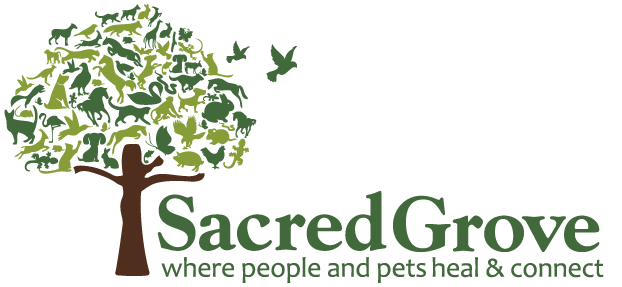Kevin Ringstaff’s online pet loss grief groups offer continuing online support for grieving animal lovers. In our interview, we talk about grief over losing animals, and what not to say to grievers. Plus, Kevin shares suggestions for navigating your grief.
Below are the highlights of our talk. For more information, including how to support someone who’s grieving, be sure to listen to the whole interview.
Why’s it so hard to lose our animals
When we think about our relationship with our animals, we can see that we’re way more intimate with them than we are with most humans. For example, who checks how you’re doing while you’re in the bathroom? If you have cats, you know the answer.
Also, many hang with us 24 hours a day, especially in the COVID years. From that, we experience a massive, intimate daily connection with them. And so, their loss is felt so deeply because we lose this intimate support, and the joy of their personality.
PetCloud® Grief Groups
Because of the need for support, Kevin decided to create live, online grief groups. This way, people see each other, share pictures and stories in real time.
How do grief groups help?
First, people find validation. In other words, they learn it’s okay that it hurts so deeply. They’re not crazy.
Second, they find community. Clearly, other people are going through this just like them. So they feel less alone. Grief shared is grief lessened.
And sharing their animals’ stories lets them feel joy again. Kevin shared how someone can be bawling because they just let their animal go. But 15 minutes later, come the stories. By the end of that discussion, they’re both laughing. They focused on the good memories, joy and experiences.
What not to say to a grieving person
To start, don’t be a fixer by trying to make them feel better. Instead, allow them their grief. Avoid sentences like these:
- They’re in a better place now.
- At least they’re not suffering anymore.
- God just needed another angel.
- It was only a [dog/ fill in the blank].
- Get another one, that will help.
- Don’t be sad.
- Look on the bright side of life!
- (FOR PEOPLE} You’ll find someone else. I never liked them anyway. There are plenty of fish in the sea.
How do we navigate our own grief?
Let it be okay to not be okay. Kevin says grief is the greatest teacher in life. Nothing else shows you what’s most important faster than death. If you gloss over those intense feelings, you miss life lessons. So journal. And find someone to talk with.
Process anger and guilt
Recognize your anger and guilt (anger turned inward) by allowing it. Discover what’s beneath the anger or guilt. Go deeper by being more descriptive than simply saying you’re angry or feel guilty. That’s because there are a billion different emotions hidden in those two words.
For many of us, it’s “I’ve lost.” As in, “I’ve lost ” my best friend, my soul mate, or my companion. Other emotions or thoughts might be:
- I am so despondent.
- I’m jealous of people whose pets are living longer than mine.
- Life is unfair. Why’d I have to lose my beloved animal?
If the emotion is justified, take action. Write a letter. Or call a board of directors, whatever you need to do. If the emotional is irrational, say what you’re thinking out loud. And talk about it with someone.
Plus, release the energy physically. For instance, you can exercise. Some folks punch or scream into a pillow. If the feeling keeps returning, find different ways to manage it, like grief support.
The energy of grief
When we grieve, we expend a massive amount of energy. As a result, we don’t have the same amount of energy to deal with everything else like we used to. We may find situations, people and even the other animals more annoying.
To conserve your energy, prioritize self-care. Say no to people and situations that anger you. Also, let go of the energy around hurtful or thoughtless statements. Don’t spend the energy on them.
Remember, animal communicators can help you through the transition. Plus grief groups can support you as you navigate your ongoing grief after the transition. View PetCloud’s support offerings in Kevin’s bio below.
Need an animal communicator to help with the transition process? I know someone who can help.
 Kevin Ringstaff (kevin@petcloud.pet)
Kevin Ringstaff (kevin@petcloud.pet)
Kevin Ringstaff has completed several grief specialist certification programs over the years, and he’s currently studying to be a board-certified hospital chaplain. Kevin spends his days talking about grief, creating activities and products around grief, and listening to the stories from people all over the country.
And he started a second company, Grieving@Work to teach management how to better support grieving employees in the workplace.
His life is currently graced and occupied by three pets. His old English sheep dog, Sir William Broderick, “Brody”, his cat, Ponce de Leon, also known as Ponce, and a tarantula that he accidentally came into possession of, Lucy.
PetCloud ® Grief Support Services for Pet Loss
- Free Virtual Pet Loss Support Groups Sundays at 3:00pm & 6:00pm PT
- Toll-Free Pet Loss Support Line: 1-833-PET-1234; daily from 9am – 9pm PT
- FB: https://www.facebook.com/www.PetCloud.pet/
- LN: https://www.linkedin.com/company/petcloud-pet/


I lost my Pug, Winston, on June 15, 2023. I had him 15 yrs and he was 18yrs old. We had taken 2 road trips, 3,000 miles each to Los Angeles. He was a wonderful road trip companion. I really miss him. I live in a Senior Community and he fit in right away. Of the 30 or so dogs here, he was the favorite. He greeted everyone he met as if they were long time friends. He was the last of the dogs to pass away. Upon hearing of his passing, several people remembered the day they first met him. He was such a special Pug. Thank you 🙏
I love hearing about Winston, Corrine! Thanks for sharing this!
I lost my pet Maddie to Stage 2 Kidney disease on March 12th. On that date I made the heartbreaking decision to have her euthanized. My vet told me that I could keep her alive by bringing her into the office twice a week for fluids. Even though my vet approved of my decision I still wanted to have her here with me despite the pain she was going through. I just need a listening ear for support. My Maddie was 20 years old when she crossed over the Rainbow Bridge. I wouldn’t mind taking part in a group counseling session on Zoom if possible to help others and myself through the grief process.
So sorry for your having to make this tough decision to release Maddie, Margaret! Reach out to Kevin Ringstaff at https://petcloud.pet/services/pet-loss-support-groups.php, for a group session. I’m always available for an individual session if you want to connect with Maddie in spirit.
My precious cat, Katy, passed April 6, 2025. She just turned 14. We had a normal morning that day. We went to church and lunch. When we came home, Katy was behind a recliner having a heart attack or stroke. Rushed her to an ER vet. He thought she also had a blood clot to her front arm. It was cold. Enlarged heart and fluid. That morning she was jumping on the counter. I had to let her go. It was traumatic. She was my everything. I would love to communicate with her spirit. Thank you.